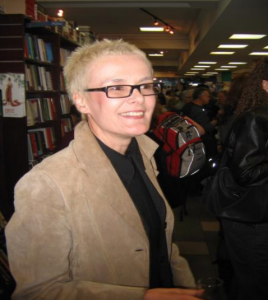Senka BOŽIĆ VRBANČIĆ
 Senka BOŽIĆ VRBANČIĆ
Senka BOŽIĆ VRBANČIĆ
The University of Zadar
Policy, Diversity, Affective Economies and Bodily
Performance
In my talk I discuss inextricability of emotions and public policies and analyse various ways in which feelings are negotiated in the public sphere. I start with anthropology of policy that stress that public policy could be seen as a mechanism that contributes
to the formation of identity. As Chris Shore and Susan Wright (1997, 2011) point out, public policies affect the lives and livelihoods of citizens. They actively constitute social reality. They give shape and meaning to what we call reality, they are often designed not so much to generate public support but to construct what they propose in order to bear on the
governance of the social. Therefore, according to them, the anthropological task is to question power relations and ‘naturalised’ assumptions which often frame public policy. Inspired by affect theory, especially by the work of Sara Ahmed (2004, 2010, 2012) and Lauren Berlant (2014, 2015, 2016), I argue that in order to understand power relations and
policies as a form of social action we also need to explore ‘emotionality of policy’, the ways in which policies are designed to offer emotional attachments to people, the kind of fantasies they mobilize (utopian and dystopian), and atmospheres they create that people move through (anxiety, fear, happiness…) in relation to the abstractions like race, gender, class and nation. To talk about emotionality of policy and affective tendencies is, as Berlant (2015) argues, almost always to talk about intensities, and “behind that linkage is a relation to the stories which we tell about ourselves, that modality of performance that
attaches feeling states to bodily performance”. In discussing some of these issues I use examples from my own ethnographic research on contemporary policies of cultural diversity in New Zealand and representations of relations between Maori, the indigenous people of New Zealand and Croatians, one of the many ethnic groups in New Zealand.
SHORT BIOGRAPHY
Senka Božić-Vrbančić holds a PhD in Anthropology from the University of Auckland, New Zealand. She has worked at the Department of Anthropology at the University of Auckland, in the Center for Sociology and Cultural Studies in Lviv, in the School of Philosophy, Anthropology and Social Inquiry at the University of Melbourne, and at the University of Zadar where she is currently Associate Professor in the Department of Ethnology and Anthropology. Her work spans the fields of anthropology, cultural studies, visual culture and memory studies with an emphasis on the politics of culture, migration, hybridity and identity issues (class/gender/ethnicity/race). She is the author of Tarara:
Croatians and Maori in New Zealand (memory, belonging, identity) (Otago University Press, 2008; Jesenski &Turk, 2018); the co-author of Hitchcockijanski pogled – Hitchcockian gaze (Jesenski & Turk, 2017) and the author of numerous journal articles and book chapters,
including “Waiting to be Loved: the European Union’s Hope to be the Loved Object” (2009), “Strong European Emotions: the Politics of Culture in the EU” (2010), ”Being Marked as Different: the Emotional Politics of Experiences of Depression and Migrant Belongings”
(2015) and “I am Tired of all of These Feelings: Narrating Suffering in the Film Sick” (2018). For her work she has received several academic awards and honors.